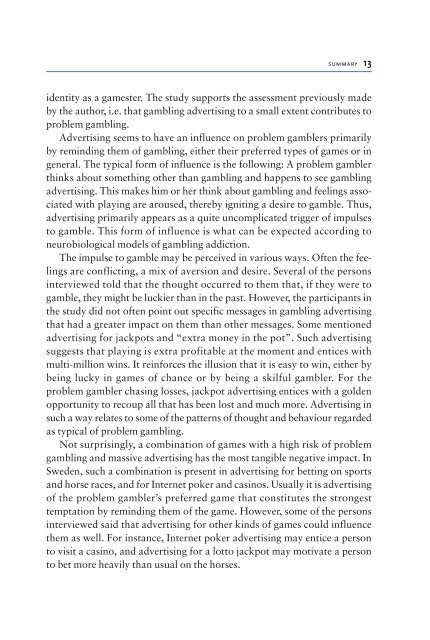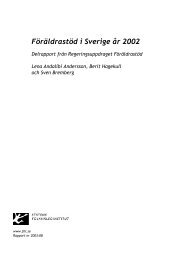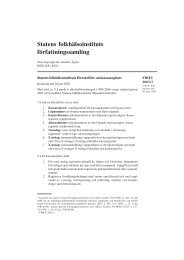Spelreklam och spelberoende - Statens folkhälsoinstitut
Spelreklam och spelberoende - Statens folkhälsoinstitut
Spelreklam och spelberoende - Statens folkhälsoinstitut
Create successful ePaper yourself
Turn your PDF publications into a flip-book with our unique Google optimized e-Paper software.
summary 13<br />
identity as a gamester. The study supports the assessment previously made<br />
by the author, i.e. that gambling advertising to a small extent contributes to<br />
problem gambling.<br />
Advertising seems to have an influence on problem gamblers primarily<br />
by reminding them of gambling, either their preferred types of games or in<br />
general. The typical form of influence is the following: A problem gambler<br />
thinks about something other than gambling and happens to see gambling<br />
advertising. This makes him or her think about gambling and feelings associated<br />
with playing are aroused, thereby igniting a desire to gamble. Thus,<br />
advertising primarily appears as a quite uncomplicated trigger of impulses<br />
to gamble. This form of influence is what can be expected according to<br />
neurobiological models of gambling addiction.<br />
The impulse to gamble may be perceived in various ways. Often the feelings<br />
are conflicting, a mix of aversion and desire. Several of the persons<br />
interviewed told that the thought occurred to them that, if they were to<br />
gamble, they might be luckier than in the past. However, the participants in<br />
the study did not often point out specific messages in gambling advertising<br />
that had a greater impact on them than other messages. Some mentioned<br />
advertising for jackpots and “extra money in the pot”. Such advertising<br />
suggests that playing is extra profitable at the moment and entices with<br />
multi-million wins. It reinforces the illusion that it is easy to win, either by<br />
being lucky in games of chance or by being a skilful gambler. For the<br />
problem gambler chasing losses, jackpot advertising entices with a golden<br />
opportunity to recoup all that has been lost and much more. Advertising in<br />
such a way relates to some of the patterns of thought and behaviour regarded<br />
as typical of problem gambling.<br />
Not surprisingly, a combination of games with a high risk of problem<br />
gambling and massive advertising has the most tangible negative impact. In<br />
Sweden, such a combination is present in advertising for betting on sports<br />
and horse races, and for Internet poker and casinos. Usually it is advertising<br />
of the problem gambler’s preferred game that constitutes the strongest<br />
temptation by reminding them of the game. However, some of the persons<br />
interviewed said that advertising for other kinds of games could influence<br />
them as well. For instance, Internet poker advertising may entice a person<br />
to visit a casino, and advertising for a lotto jackpot may motivate a person<br />
to bet more heavily than usual on the horses.

















